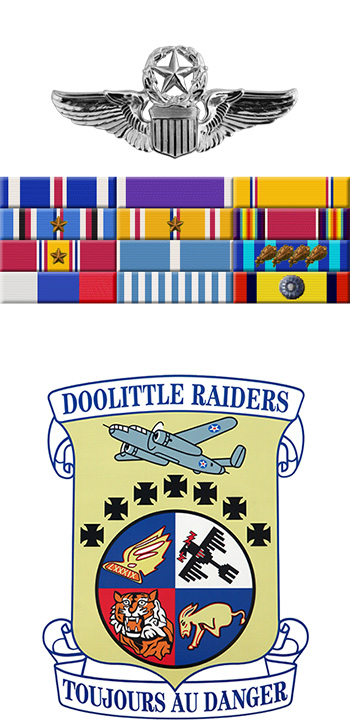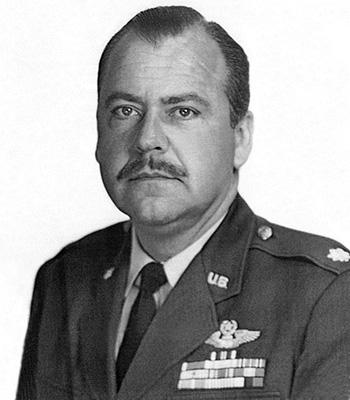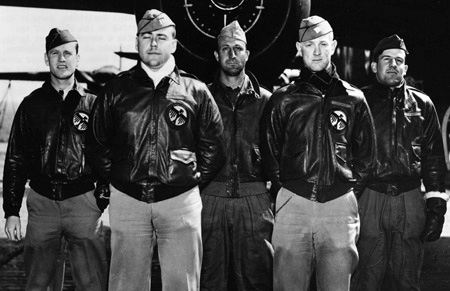
|
Harold F. Watson |
 |
|||
| Rank, Service | ||||
Lieutenant Colonel O-5, U.S. Air Force |
||||
| Veteran of: | ||||
|
||||
| Tribute: | ||||
Harold Watson was born on April 3, 1916, in Buffalo, New York. He enlisted in the Aviation Cadet Program of the U.S. Army Air Corps on November 6, 1939, and was commissioned a 2d Lt and awarded his pilot wings on August 31, 1940. His first assignment was as a B-18 Bolo, B-23 Dragon, and then B-25 Mitchell pilot with the 34th Bomb Squadron of the 17th Bomb Group at McChord Field, Washington, and then at Pendleton Army Airfield, Oregon, from September 1940 until he was selected for the Doolittle Mission in February 1942. Lt Watson was the pilot on the ninth B-25 to take off from the aircraft carrier USS Hornet (CV-8) on April 18, 1942, and after bombing their assigned targets in Tokyo, Japan, the crew bailed out over China when their aircraft ran out of fuel. He was badly injured during the bail-out, and after returning to the United States, he was assigned to Headquarters U.S. Army Air Forces in Washington, D.C., while he recuperated from his injuries at Walter Reed Army Hospital from June 1942 to May 1943. Capt Watson was assigned to do lectures on his experiences with the Doolittle Raid around the United States from June to October 1943, followed by service as Base Operations Officer at Gowen Field, Idaho, from November 1943 to April 1944. His next assignment was as a Retention Officer at Atlantic City, New Jersey, from April 1944 to October 1945, and then as an Admin Officer, Assistant Base Adjutant, and as Base Adjutant with the 268th, 201st, and 200th Army Air Force Base Units at Peterson Field, Colorado, from October 1945 to June 1947. Maj Watson served as Base Adjutant with the 203rd Base Unit at Spokane Field, Washington, from June to September 1947, and then on the staff of the 92nd Bomb Group at Spokane from September to October 1947. His next assignment was as a B-29 Superfortress pilot and as Deputy Commander of the 325th Bomb Squadron of the 92nd Bomb Group at Spokane AFB from October 1947 to April 1948, followed by service as Chief of the Collection Section, Chief of the Operations Branch, Chief of the Operations Center, and then as Assistant Chief of the Special Projects Branch with the 1009th Special Weapons Squadron at Bolling AFB, Washington, D.C., from April 1948 to July 1952. This was the unit responsible for detecting nuclear detonations anywhere in the world. He attended Air Command and Staff College at Maxwell AFB, Alabama, from July to December 1952, and was a patient at the base hospital at Maxwell from January to March 1953. Lt Col Watson next served as a B-47 Stratojet pilot and as an Operations Staff Officer with the 308th Bomb Wing at Hunter AFB, Georgia, from March to April 1953, followed by service as Director of Personnel with the 804th Air Base Group at Hunter AFB from April 1953 to April 1954. He served as a Division Chief with the Director of Targets with Headquarters Far East Air Forces in Tokyo, Japan, from April 1954 to October 1955, and then as a Staff Operations Officer with the 805th Air Base Group at Barksdale AFB, Louisiana, from October 1955 to June 1956. His next assignment was as a Branch Chief in the Inspection Division of the Inspector General's Office with Headquarters 2nd Air Force at Barksdale from June 1956 to February 1957, followed by service as Base Personnel Officer and then as Director of Military Personnel with the 811th and then 31st Air Base Groups at Turner AFB, Georgia, from March 1957 to June 1958. Lt Col Watson served as Director of Personnel with the 506th Tactical Fighter Wing at Tinker AFB, Oklahoma, from June 1958 to April 1959, and then as Director of Material, Base Inspector General, Director of Personnel, Executive Officer with the 831st Air Base Group at George AFB, California, from April 1959 until his retirement from the Air Force on November 1, 1961. Harold Watson died on September 14, 1991. |
||||
|
||||


